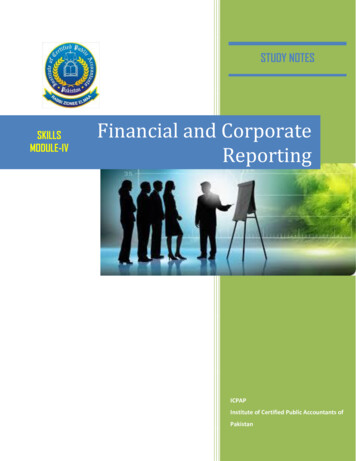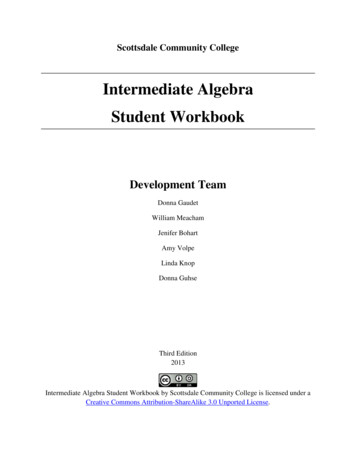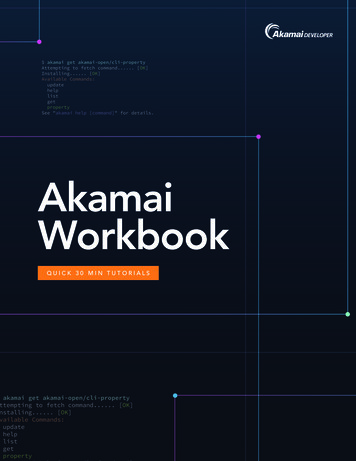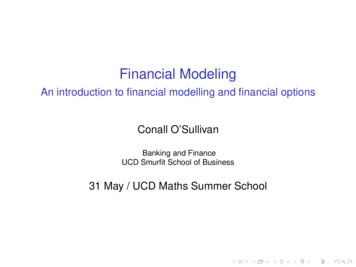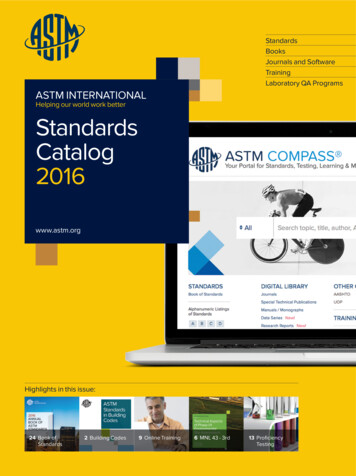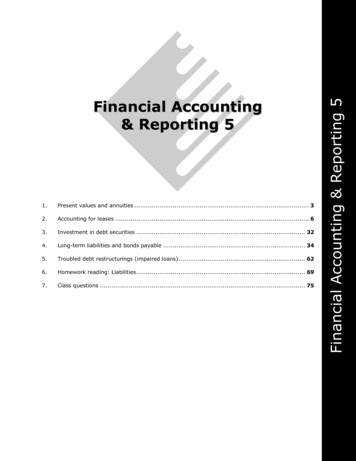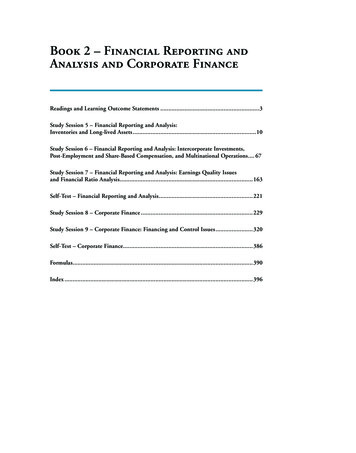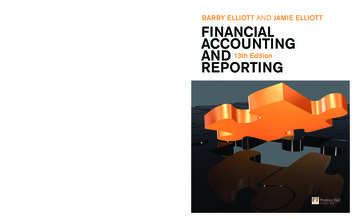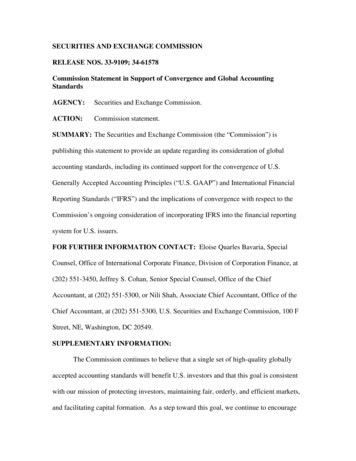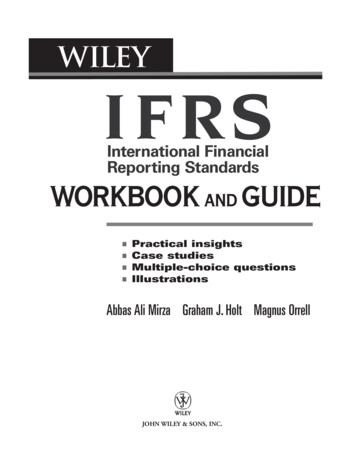
Transcription
WileyI FRSInternational FinancialReporting StandardsWORKBOOK AND GUIDE Practical insightsCase studiesMultiple-choice questionsIllustrationsAbbas Ali Mirza Graham J. Holt Magnus OrrellJOHN WILEY & SONS, INC.
WileyI FRSInternational FinancialReporting StandardsWORKBOOK AND GUIDE
WileyI FRSInternational FinancialReporting StandardsWORKBOOK AND GUIDE Practical insightsCase studiesMultiple-choice questionsIllustrationsAbbas Ali Mirza Graham J. Holt Magnus OrrellJOHN WILEY & SONS, INC.
Portions of this book have their origins in copyrighted materials from the International Accounting StandardsBoard. These are noted by reference to the specific pronouncements, except for certain of the definitionsintroduced in bold type, which appear in a separate section at the beginning of each chapter. Completecopies of the international standards are available from the IASB. Copyright International AccountingStandards Board, 30 Cannon Street, London EC4M 6XH, United Kingdom.This book is printed on acid-free paper. Copyright 2006 by John Wiley & Sons, Inc. All rights reserved.Published by John Wiley & Sons, Inc., Hoboken, New JerseyPublished simultaneously in Canada.No part of this publication may be reproduced, stored in a retrieval system, or transmitted in any form or byany means, electronic, mechanical, photocopying, recording, scanning, or otherwise, except as permittedunder Section 107 or 108 of the 1976 United States Copyright Act, without either the prior writtenpermission of the Publisher, or authorization through payment of the appropriate per-copy fee to theCopyright Clearance Center, 222 Rosewood Drive, Danvers, MA 01923, (978)750-8400, fax (978)750-4470,or on the Web at www.copyright.com. Requests to the Publisher for permission should be addressed to thePermissions Department, John Wiley & Sons, Inc., 111 River Street, Hoboken, NJ 07030, (201)748-6011,fax (201)748-6008, or online at http://www.wiley.com/go/permission.Limit of Liability/Disclaimer of Warranty: While the publisher and author have used their best efforts inpreparing this book, they make no representations or warranties with respect to the accuracy or completenessof the contents of this book and specifically disclaim any implied warranties of merchantability or fitness fora particular purpose. No warranty may be created or extended by sales representatives or written salesmaterials. The advice and strategies contained herein may not be suitable for your situation. You shouldconsult with a professional where appropriate. Neither the publisher nor author shall be liable for any loss ofprofit or any other commercial damages, including but not limited to special, incidental, consequential, orother damages.For general information on our other products and services, please contact our Customer Care Departmentwithin the US at 800-762-2974, outside the US at 317-572-3993 or fax 317-572-4002.Wiley also publishes its books in a variety of electronic formats. Some content that appears in print may notbe available in electronic books. For more information about Wiley products, visit our Web site atwww.wiley.com.ISBN 13: 978-0471-69742-8ISBN 10: 0-471-69742-7Printed in the United States of America10 9 8 7 6 5 4 3 2 1
n to International Financial Reporting Standards .IASB Framework .Presentation of Financial Statements (IAS 1) .Inventories (IAS 2) .Cash Flow Statements (IAS 7) .Accounting Policies, Changes in Accounting Estimates and Errors (IAS 8) .Events After the Balance Sheet Date (IAS 10) .Construction Contracts (IAS 11) .Income Taxes (IAS 12) .Segment Reporting (IAS 14) .Property, Plant, and Equipment (IAS 16) .Leases (IAS 17) .Revenue (IAS 18) .Employee Benefits (IAS19) .Accounting for Government Grants and Disclosure of Government15Assistance (IAS 20) .16The Effects of Changes in Foreign Exchange Rates (IAS 21) .17Borrowing Costs (IAS 23) .18Related Party Disclosures (IAS 24) .19Accounting and Reporting by Retirement Benefit Plans (IAS 26) .20Consolidated and Separate Financial Statements ( IAS 27) .21Investments in Associates (IAS 28) .22Financial Reporting in Hyperinflationary Economies (IAS 29) .Disclosures in the Financial Statements of Banks and Similar Financial23Institutions (IAS 30) .24Interests in Joint Ventures (IAS 31) .25Financial Instruments: Presentation (IAS 32) .26Financial Instruments: Recognition and Measurement (IAS 39) .27Earnings Per Share (IAS 33) .28Interim Financial Reporting (IAS 34) .29Impairment of Assets (IAS 36) .30Provisions, Contingent Liabilities, and Contingent Assets (IAS 37) .31Intangible Assets (IAS 38) .32Investment Property (IAS 40) .33Agriculture (IAS 41) .34First-Time Adoption of International Financial Reporting Standards (IFRS 1)35Share-Based Payments (IFRS 2) .36Business Combinations (IFRS 3) .37Insurance Contracts (IFRS 4) .38Noncurrent Assets Held for Sale and Discontinued Operations (IFRS 5) .39Exploration for and Evaluation of Mineral Resources (IFRS 6) .40Financial Instruments: Disclosures (IFRS 7) .Index .Page 356365371380
FOREWORDby the Chairman of IASBI and my fellow Board members at the International Accounting Standards Board (IASB) are committedto developing high quality, understandable, and enforceable global accounting standards that meet the demands for comparable and transparent information in the world’s capital markets. Recently we completed awork program to develop and issue a stable platform of such standards. Those standards, the InternationalFinancial Reporting Standards (IFRS), are now being implemented in a large number of countries around theworld. This is a major achievement on the road towards the global acceptance of a single set of accountingstandards.The responsibility for achieving high quality financial reporting, however, does not rest solely withIASB. Our role is limited to providing the set of standards that entities should apply to achieve high quality,comparable, and transparent financial reporting. For IFRS to be properly understood, implemented, and applied in practice, education and training of all relevant parties—including financial statement preparers,auditors, regulators, financial analysts, and other users of financial statements as well as accountingstudents—is essential.This book should be a helpful tool in this regard. The approach of the book is to discuss core conceptsand other key elements of the standards and to provide training material in the form of worked case studiesand questions to support successful learning of the material. Consequently, the book should be useful forstudents who prepare for professional exams and for financial statement preparers, auditors, regulators, financial analysts, and other users of financial statements who in their work need to be familiar with the standards. The book should help practitioners and students alike understand, implement, and apply the key elements of the standards.Sir David TweedieChairman of IASBDecember, 2005
FOREWORDby the Secretary General of IOSCOIn recent years much has been written about International Financial Reporting Standards (IFRS) so it isopportune that a publication such as this would be released at this time particularly since this initiative helpsto bring such clarity and focus to the debate.Globalization is taking place at an ever more rapid pace. As cross-border financial activity increases,capital markets become more dependent on each other. As financial markets become ever more interdependent, there is a greater need for the development of internationally recognized and accepted standards dealingwith capital market regulation.The development of IFRS can be seen within this broader framework. They represent an especially useful instrument designed to promote a stable and more secure international regulatory environment. At thesame time, IFRS deliver on accounting and disclosure objectives as well as the pursuit of improved transparency of global financial reporting.For the International Organization of Securities Commissions (IOSCO), the development and subsequentprogress of IFRS represents a priority outcome. The organization has been a key stakeholder with an activeinvolvement in the process of setting the standards and in continually assessing their quality.This involvement reflects a long history of commitment by IOSCO to efforts aimed at strengthening theintegrity of international markets through the promotion of high quality accounting standards, including rigorous application and enforcement.At the same time, there is an obligation of international standard setters to be responsive to concernsover the application and interpretation of the standards. This is a key complement to the success of IFRS andone which we take seriously.Ultimately, accounting standards setting is a continuous process that must respond to changes and developments in the markets and the information needs of investors. Indeed, it has always been the case that effective financial reporting is fundamental to investor confidence as well as good corporate governance.In the long term, the adoption of IFRS in many countries and their use in numerous cross-border transactions will help to bring about these high quality global accounting standards by providing transparent andcomparable information in financial reports.Although as an international standards setter IOSCO is not in position to endorse external publications,we have always recognized that by helping to promote clear information about the IFRS, publications such asthis one serve a particularly useful function both as an educational opportunity and also to encourage confidence in these standards. On that basis it is most welcome.Philippe RichardIOSCO Secretary GeneralMarch 2006
PREFACEAchieving consistency in financial reporting worldwide is the need of the hour, especially if meaningfulcomparisons are to be made of financial information emanating from different countries using accountingstandards that, until recently, were vastly different from each other. Thus, there has arisen the urgent need forpromulgation of a common set of global accounting standards or, in other words, global convergence into acommon language of accounting for the financial world. International Financial Reporting Standards (IFRS),the standards promulgated by the International Accounting Standards Board (IASB), previously known asInternational Accounting Standards (IAS) that were issued by the International Accounting StandardCommittee (IASC), the IASB’s predecessor body, appear to be emerging as the global accounting standardsand, according to some, could even qualify for the coveted title of “the Esperanto of accounting.”This is a challenging and exciting time to be writing a book on IFRS. Challenging, because it is indeed adaunting task to publish a book on a body of knowledge such as IFRS, which is undergoing significantchanges at an unprecedented pace. In some cases, changes were made to certain IASB standards within thesame year, and thus we, as authors, had to revise chapters when amendments to existing standards wereannounced. In certain cases, even after chapters were initially written and finalized, in order to keep the bookcurrent, we had to rewrite parts. Yet this is also an exciting time to be writing a book on a subject of globalimportance such as IFRS, since the IASB standards are rapidly being adopted in a large number of countriesall around the world. For instance, by the time this book goes to print, most countries in Europe, including allof the 25 member states of the European Union, will require listed companies to prepare their consolidatedfinancial statements in accordance with IFRS instead of local requirements, and many countries in Africa,Asia, Australia, and the Americas are adopting IFRS as their national accounting standards. Knowing fullwell that the book will have to cater to the requirements of users globally made the task of writing even morechallenging.Whether you are an accountant, auditor, investor, banker, regulator, or financial analyst, understandingand appreciating the fundamental principles and requirements of IFRS has become more important than everbefore. In this new financial world, knowledge of the fundamental principles of IFRS is essential to meet thegrowing demands of a changing regulatory and market environment. Cognizant of that, we embarked on thisbook project to help users and preparers of IFRS financial statements alike.We have written this book with the end user in mind, which should make it user-friendly. For instance, ifyou are an accountant or an auditor working in a country that has recently adopted IFRS (say, one of thecountries in the European Union), you are now faced with the challenges of being able to apply thesestandards and to read and understand financial statements prepared in accordance with them. This book willhelp you to do that. We believe that this book’s real strength lies in the fact that it explains the IASBstandards in a lucid manner so even first-time adopters of IFRS can understand the subject. The bookillustrates the practical application of the IASB standards using easy-to-apply illustrations and simpleexamples. It goes a step further and provides copious learning aids in the form of case studies (with workedsolutions), multiple-choice questions (with answers), and practical insights. We hope its simple, step-by-stepapproach will guide you in the application of IFRS.In general, the structure and contents of the book are consistent with the order and scope of eachstandard; each chapter discusses a specific IFRS, and the chapters are ordered consistent with the numberingof the IFRS currently in effect. This structure allows you to use the book as a handbook, side by side with thebound volume of standards issued by IASB. The only exception is the chapter on IAS 39, which is locatedimmediately after the chapter on IAS 32 in this book, since both standards address the same topic: theaccounting for financial instruments. Also, the chapters dealing with IAS precede the chapters dealing withIFRS.We hope that this book will greatly facilitate learning and will also help readers to understand thetechnical complexities of the standards. Although a great deal of effort has gone into writing this book, wesincerely believe that there is always scope for improvement. Any suggestions and comments for futureeditions are therefore encouraged. We humbly submit that any views expressed in this publication are oursalone and do not necessarily represent those of the firms or organizations we are part of.Finally, we wish all our readers a very educating journey through the book.Abbas Ali MirzaGraham HoltMagnus OrrellMarch 2006
ACKNOWLEDGMENTSThis book would not have seen the light of the day without the help of so many wonderful people aroundthe globe who have helped us to put it together. This IFRS workbook project was conceived andconceptualized way back in 1998, but due to certain unanticipated issues that surfaced later, the project wasdropped, only to be revived in 2005. We would be remiss in our duties if we did not thank the editors at JohnWiley & Sons, Inc., USA, who had implicit faith in our abilities and greatly helped us in giving shape to thiscreative endeavor. In particular, we wish to place on record their sincere appreciation of the help provided tous by the following individuals of John Wiley & Sons: Robert Chiarelli, for his patronage of this bookproject; John De Remigis, for his stewardship of this book project from its incubation stages in 1998 to itscompletion in 2006 and for his perseverance for these many years; Judy Howarth and Brandon Dust, for theirable guidance and patience; Natasha Andrews and Pam Reh and their editorial staff, for their creative andvaluable editorial comments and assistance; and Julie Burdin, for her outstanding marketing plan and ideas.We also wish to place on record our sincere appreciation of the untiring efforts of Ms. Liesel Knorr, thecurrent secretary general of the German Accounting Standards Board and formerly technical director of theInternational Accounting Standards Committee (IASC), the predecessor body to the IASB, for her thoroughtechnical review of the entire manuscript. Her invaluable comments have all been taken into account inwriting this book.We are also grateful to all our friends and colleagues who helped us during the preparation of this book.Abbas Ali Mirza wishes to place on record his sincere gratitude for all the constructive suggestionsoffered to him by his friends in conceptualizing the idea of such a workbook on IFRS during its formativestages. Furthermore, for their unstinting support, creative ideas, and invaluable contributions, he also wishesto thank his peers and mentors, in particular: Omar Fahoum, chairman and managing partner, Deloitte &Touche (M.E.); Graham Martins, partner, Pannell Kerr Forster, United Arab Emirates; Dr. Barry J. Epstein,partner, Russell Novak & Co., LLP, USA, his longtime coauthor of the other IFRS book published by JohnWiley & Sons, Inc., USA (currently entitled Wiley: IFRS 2006); and all his partners and colleagues fromDeloitte & Touche (M.E.), including but not limited to Joe El Fadl, Graham Lucas, Anis Sadek, MusaDajani, Ghassan Jaber, Vikas Taktiani, Hala Khalid, Shivani Agarwal, and Umme Kulsoom Soni.Graham Holt wishes to thank all the special people who have directly and indirectly helped him inpreparing this book. (They know he is grateful.)Magnus Orrell extends his special thanks to his wife, Kristin Orrell, as well as to Andrew Spooner ofDeloitte & Touche LLP in the United Kingdom and Bengt-Allan Mettinger, accounting consultant inThailand, who all read earlier versions of the material in this book relating to financial instruments andprovided many valuable comments and suggestions.
ABOUT THE AUTHORSAbbas Ali Mirza is a partner at Deloitte & Touche (M.E.) based in Dubai and handles audits of majorinternational and local clients of the firm. At Deloitte he is also responsible for regional functions, such astechnical consultation on complex accounting and auditing issues. Abbas heads the Learning function forDeloitte, Middle East, and is a member of the Global firm’s EMEA Learning Executive. He has had adistinguished career in accounting, auditing, taxation, and business consulting and has worked forinternational audit and consulting firms in the United States of America, the Middle East, and India. Abbas isa frequent principal/keynote speaker at major global conferences on International Financial ReportingStandards (IFRS) and has chaired world-class events on accounting, such as the World Accounting Summitheld in Dubai under the auspices of the United Nations Conference on Trade and Development (UNCTAD).He has been a coauthor, from inception, of another book on IFRS published by John Wiley & Sons, Inc.,which is in its tenth anniversary edition and is currently entitled Wiley: IFRS 2006. He holds or has heldmany positions of repute in the accounting profession globally including 21st Session Chairman, United Nations’ Intergovernmental Working Group of Experts onInternational Standards on Accounting & Reporting (ISAR), to which position he was elected at theUNCTAD in Geneva in November 2004 Member of the Developing Nations Permanent Task of the International Federation of Accountants(IFAC), recently renamed IFAC’s Developing Nations Committee Member of the Accounting Standards Committee, Securities and Exchange Board of India (SEBI),India Vice-Chairman of Auditors’ Group, Dubai Chamber of Commerce and Industry (DCCI) Technical Adviser to the Gulf Co-operation Council Accounting and Auditing Organization(GCCAAO) Member of the Consultative Group of Experts on Corporate Governance Disclosures, United NationsConference on Trade & Development (UNCTAD) Member of the Consultative Group of Experts on Corporate Social Responsibility, United NationsConference on Trade & Development (UNCTAD)Graham Holt qualified as a Chartered Accountant (Institute of Chartered Accountants in England &Wales) with Price Waterhouse and is a fellow of the Association of Chartered Certified Accountants(ACCA). He holds B.Com and MA Econ qualifications also. As a current ACCA examiner, he has beenprominent in the development of their IFRS stream and their examination scheme. He is a principal lecturerat the Manchester Metropolitan University Business School, where he is director of Professional Courses.Graham has given lectures on IFRS throughout the world and has many publications in the subject area. Hehas also been involved in running training courses on IFRS.Magnus Orrell is in the national office of Deloitte & Touche LLP in Wilton, Connecticut (USA), wherehe specializes in financial instrument accounting issues under both IFRS and U.S. GAAP. Prior to joiningDeloitte, he most recently served as project manager at the International Accounting Standards Board (IASB)in London, the United Kingdom, where he played a key role in the development of the current version of theinternational standards on financial instruments. Previously in his career, he served as a member of theSecretariat of the Basel Committee on Banking Supervision at the Bank for International Settlements (BIS) inBasel, Switzerland; as an official of the European Commission in Brussels, Belgium; and as an accountingexpert at the Financial Supervisory Authority in Stockholm, Sweden. Apart from being a Certified PublicAccountant (CPA) in the State of Connecticut, he also holds the Chartered Financial Analyst (CFA)designation conferred by the CFA Institute (formerly the Association for Investment Management andResearch). Additionally, he holds a degree and master of science in business administration and economics, adegree of master of laws, and a master of accounting and financial management. He has been a frequentspeaker on financial reporting issues at seminars, conferences, and executive-level meetings in manycountries in Europe, Asia, and the Americas, and has authored articles in both accountancy and financeperiodicals.
11.INTRODUCTION TO INTERNATIONALFINANCIAL REPORTING STANDARDSINTRODUCTIONInternational Accounting Standards (IAS), now renamed International Financial Reporting Standards (IFRS), are gaining acceptance worldwide. This section discusses the extent to which IFRSare recognized around the world and includes a brief overview of the history and key elements ofthe international standard-setting process.2.WORLDWIDE ADOPTION OF IFRS2.1 In the last few years, the international accounting standard-setting process has been able toclaim a number of successes in achieving greater recognition and use of IFRS.2.2 A major breakthrough came in 2002 when the European Union (EU) adopted legislation thatrequires listed companies in Europe to apply IFRS in their consolidated financial statements. Thelegislation came into effect in 2005 and applies to more than 7,000 companies in 28 countries, including countries such as France, Germany, Italy, Spain, and the United Kingdom. The adoptionof IFRS in Europe means that IFRS replace national accounting standards and requirements as thebasis for preparing and presenting group financial statements for listed companies in Europe.2.3 Outside Europe, many other countries are also moving to IFRS. In 2005, IFRS had becomemandatory in many countries in Southeast Asia, Central Asia, Latin America, Southern Africa, theMiddle East, and the Caribbean. In addition, countries such as Australia, Hong Kong, New Zealand, Philippines, and Singapore had adopted national accounting standards that mirror IFRS. Itwas estimated that more than 70 countries required their listed companies to apply IFRS in preparing and presenting financial statements in 2005.Countries that have Adopted IFRSCountries in which some or all companies are required to apply IFRS or IFRS-based standardsare listed below.Africa:Egypt, Kenya, Malawi, Mauritius, Namibia, South Africa, TanzaniaAmericas:Bahamas, Barbados, Costa Rica, Dominican Republic, Ecuador, Guatemala, Guyana,Haiti, Honduras, Jamaica, Nicaragua, Panama, Peru, Trinidad and Tobago, VenezuelaAsia:Armenia, Bahrain, Bangladesh, China, Georgia, Hong Kong, Jordan, Kazakhstan, Kuwait,Kyrgyzstan, Lebanon, Nepal, Oman, Philippines, Qatar, Singapore, Tajikistan, UnitedArab EmiratesEurope:Austria, Belgium, Bosnia, Bulgaria, Croatia, Cyprus, Czech Republic, Denmark, Estonia,Finland, France, Germany, Greece, Hungary, Iceland, Ireland, Italy, Latvia, Liechtenstein,Lithuania, Luxembourg, Macedonia, Malta, Netherlands, Norway, Poland, Portugal,Romania, Russia, Slovenia, Slovak Republic, Spain, Sweden, Ukraine, United Kingdom,YugoslaviaOceania:Australia, New Zealand, Papua New Guinea2.4 The adoption of standards that require high-quality, transparent, and comparable informationis welcomed by investors, creditors, financial analysts, and other users of financial statements.
2Wiley IFRS Workbook and GuideWithout common standards, it is difficult to compare financial information prepared by entities located in different parts of the world. In an increasingly global economy, the use of a single set ofhigh-quality accounting standards facilitates investment and other economic decisions across borders, increases market efficiency, and reduces the cost of raising capital.3.REMAINING EXCEPTIONS3.1 Measured in terms of the size of their capital markets, the most significant remaining exceptions to the global recognition of IFRS are the United States (US), Japan, and Canada. In thesecountries, entities continue to be required to follow local accounting standards.3.2 The International Accounting Standards Board (IASB), the body in charge of setting IFRS,works closely with the national accounting standard-setting bodies in these countries, including theUS Financial Accounting Standards Board (FASB) and the Accounting Standards Board of Japan(ASBJ), to narrow the differences between local accounting standards and IFRS. In Canada, a proposal for conforming local accounting standards to IFRS has been published.3.3 In the US, the domestic securities regulator (Securities and Exchange Commission, SEC) hasdeveloped a roadmap for eliminating the current requirement for non-US companies that raisecapital in US markets to prepare a reconciliation of their IFRS financial statements to US GenerallyAccepted Accounting Principles (US GAAP).4.THE INTERNATIONAL ACCOUNTING STANDARDS COMMITTEEFrom 1973 until 2001, the body in charge of setting the international standards was the International Accounting Standards Committee (IASC). The principal significance of IASC was to encourage national accounting standard setters around the world to improve and harmonize nationalaccounting standards. Its objectives, as stated in its Constitution, were to Formulate and publish in the public interest accounting standards to be observed in thepresentation of financial statements and to promote their worldwide acceptance and observance Work generally for the improvement and harmonization of regulations, accounting standards,and procedures relating to the presentation of financial statements4.1IASC and the Accounting ProfessionIASC always had a special relationship with the international accounting profession. IASC wascreated in 1973 by agreement between the professional acc
Financial Reporting Standards (IFRS), are now being implemented in a large number of countries around the world. This is a major achievement on the road towards the global acceptance of a single set of accounting standards. The responsibility for achieving high quality financial reporting, however, does not rest solely with IASB.
